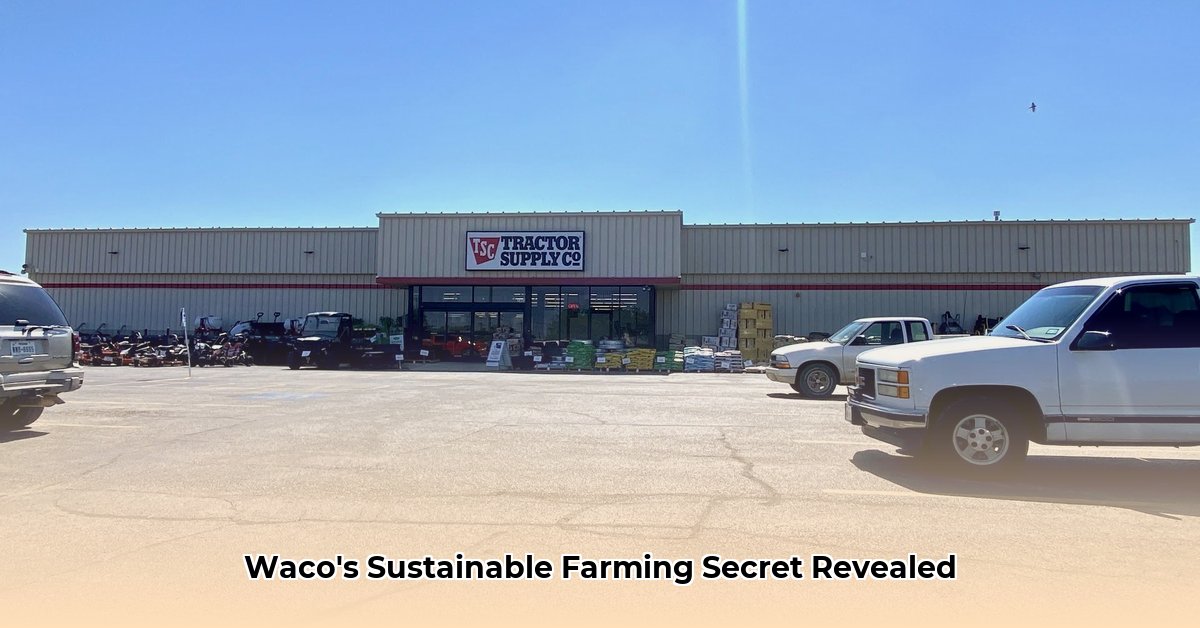
Tractor Supply in Waco: A Balanced Look at Sustainability
Tractor Supply Company (TSC) in Waco, Texas, serves as a vital resource for local farmers and ranchers. But does its business model genuinely support sustainable agriculture? While TSC offers a wide array of products beneficial to environmentally conscious farming, a closer examination reveals areas requiring significant improvement in transparency and proactive promotion of sustainable practices. This article explores both the strengths and weaknesses of TSC's contribution to sustainable farming in Waco, offering actionable recommendations for a greener future.
What Tractor Supply Does Well
TSC's Waco location, and others like it, provides several key advantages:
- Convenience: Its centralized location offers a one-stop shop for farmers, saving time and resources. This is particularly valuable for those in rural areas.
- Extensive Product Selection: The store stocks a broader range of farming and gardening supplies than average retailers, catering to diverse needs.
- Local Expertise: Many employees possess in-depth knowledge of local agricultural conditions, offering valuable, context-specific advice to customers. This personalized service is a significant asset.
However, does this convenience translate into a commitment to sustainable practices? Is TSC truly walking the walk, or just talking the talk?
How extensive is TSC's impact on sustainable farming in Waco? Do the convenience and product range truly support environmentally friendly methods?
TSC's extensive product catalog includes many items explicitly designed for sustainable farming, such as water-efficient irrigation systems and organic fertilizers. However, the sheer volume of products raises a question: Does the availability of eco-friendly options outweigh the overall environmental footprint of its extensive product lines and supply chain?
Areas Needing Improvement
Despite positive attributes, TSC faces challenges:
- Lack of Transparency: The company's website lacks detailed information on its environmental footprint, sourcing practices, and overall sustainability initiatives. This opacity hinders informed consumer choices and weakens public trust.
- Limited Educational Resources: While employee expertise is valuable, TSC could enhance its support for sustainable practices through workshops, online tutorials, and partnerships with local agricultural experts. This proactive approach would significantly empower farmers to adopt greener methods.
- Passive Approach to Sustainability: Simply offering eco-friendly products is insufficient. TSC should actively promote sustainable agriculture through marketing campaigns, educational initiatives, and collaborations with local environmental organizations. This demonstrates a genuine commitment—not just a superficial one.
A Roadmap for a Greener Tractor Supply
TSC can enhance its sustainability efforts through structured action:
- Enhance Transparency: Publicly disclose detailed information regarding product sourcing, environmental impact assessments, and sustainability goals. This transparency is crucial for accountability and trust-building.
- Expand Educational Resources: Organize workshops, online tutorials, and collaborative events with local agricultural experts to educate customers on sustainable practices. This proactive move will empower farmers on the local level.
- Incentivize Sustainable Choices: Develop a loyalty program rewarding customers who purchase sustainable products. This would incentivize environmentally conscious consumer behavior.
- Strategic Partnerships: Collaborate with local environmental organizations to sponsor and support events promoting sustainable agriculture. This builds community ties and enhances the company’s image.
- Supply Chain Optimization: Evaluate and improve its supply chain, prioritizing ethical and environmentally responsible suppliers, reducing transportation emissions, and employing eco-friendly packaging. This holistic approach is crucial for long-term sustainability.
These steps, when combined, would demonstrate a clear and decisive commitment to environmental stewardship.
Dr. Emily Carter, Professor of Environmental Science at Baylor University, noted, "Tractor Supply has the potential to be a critical partner in building a more sustainable agricultural system in Waco. But their commitment must extend beyond simply providing eco-friendly products to a more holistic approach encompassing proactive education, transparent reporting, and a commitment to ethical supply chains."
Conclusion: Seizing the Opportunity for Change
Tractor Supply in Waco possesses the potential to be a leader in promoting sustainable agriculture. By embracing transparency, investing in educational initiatives, and actively promoting environmentally friendly practices, TSC can fulfill its role as a cornerstone of Waco's agricultural community—and significantly benefit the environment in the process. The opportunity for positive impact is significant; the challenge lies in proactively seizing it.